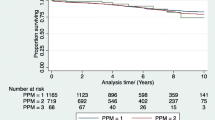Abstract
Negative impact of prosthesis-patient mismatch on long-term survival after valve replacement has been reported. However, the effect of prosthesis-patient mismatch after bioprosthetic mitral valve replacement has not yet been well examined. The purpose of this study was to investigate the effect of prosthesis-patient mismatch on late outcomes after bioprosthetic mitral valve replacement for mitral regurgitation. A total of 181 patients underwent bioprosthetic mitral valve replacement between April 2008 and December 2016. After excluding patients with mitral stenosis and those with incomplete data, 128 patients were included in the study. Postoperative transthoracic echocardiography was performed before discharge for all patients and the effective orifice area of bioprosthetic mitral valve was calculated using the formula: 220/pressure half-time, and the effective orifice area index was calculated by the formula: effective orifice area/body surface area. Prosthesis-patient mismatch was defined as a postoperative effective orifice area index ≤ 1.2 cm2/m2. The characteristics and outcomes were compared between the groups. There were 34 patients (26.6%) with prosthesis-patient mismatch and 94 patients (73.4%) without prosthesis-patient mismatch. There were no significant differences in the in-hospital mortality and morbidities. Multivariable analysis showed that prosthesis-patient mismatch was an independent predictor of late mortality (hazard ratio 3.38; 95% confidence interval 1.69–6.75; p = 0.001) and death from heart failure (hazard ratio 31.03, 95% confidence interval 4.49–214.40, p < 0.001). Prosthesis-patient mismatch at discharge after mitral valve replacement for mitral regurgitation was associated with long-term mortality and death from heart failure.


Similar content being viewed by others
References
Rahimtoola SH. The problem of valve prosthesis-patient mismatch. Circulation. 1978;58:20–4.
Hong S, Yi G, Youn YN, et al. Effect of the prosthesis-patient mismatch on long-term clinical outcomes after isolated aortic valve replacement for aortic stenosis: a prospective observational study. J Thorac Cardiovasc Surg. 2013;146:1098–104.
Guo L, Zheng J, Chen L, et al. Impact of prosthesis-patient mismatch on short-term outcomes after aortic valve replacement: a retrospective analysis in East China. J Cardiothorac Surg. 2017;12:42.
Yazdanbakhsh AP, van den Brink RB, Dekker E, et al. Small valve area index: its influence on early mortality after mitral valve replacement. Eur J Cardiothorac Surg. 2000;17:222–7.
Ruel M, Rubens FD, Masters RG, et al. Late incidence and predictors of persistent or recurrent heart failure in patients with mitral prosthetic valves. J Thorac Cardiovasc Surg. 2004;128:278–83.
Lam BK, Chan V, Hendry P, et al. The impact of patient prosthesis mismatch on late outcomes after mitral valve replacement. J Thorac Cardiovasc Surg. 2007;133:1464–73.
Magne J, Mathieu P, Dumesnil JG, et al. Impact on prosthesis-patient mismatch on survival after mitral valve replacement. Circulation. 2007;115:1417–25.
Jamieson WR, Gemann E, Ye J, et al. Effect of prosthesis-patient mismatch on long-term survival with mitral valve replacement: assessment to 15 years. Ann Thorac Surg. 2008;87:1135–41.
Shi WY, Yap CH, Hayward PA, et al. Impact of prosthesis patient mismatch after mitral valve replacement: a multicenter analysis of early outcomes and midterm survival. Heart. 2011;97:1074–81.
Aziz A, Lawton JS, Maniar HS, et al. Factors affecting survival after mitral valve replacement in patients with prosthesis-patient mismatch. Ann Thorac Surg. 2010;90:1202–10.
Akuffu AM, Zhao H, Zheng J, et al. Prosthesis-patient mismatch after mitral valve replacement: a single-centered retrospective analysis in East China. J Cardiothorac Surg. 2018;13:100.
Pibarot P, Dumesnil JG. Prosthesis-patient mismatch in the mitral position: old concept, new evidence. J Thorac Cardiovasc Surg. 2007;133:1405–8.
St. Jude Medical. Summary of safety and effectiveness data: EpicTM Valve and EpicTM Supra Valve P040021/S4. Available at: https://www.accessdata.fda.gov/cdrh_docs/pdf4/P040021S004b.pdf. Accecced 20 Jun 2021.
Lee SH, Chang BC, Youn YN, et al. Impact of prosthesis-patient mismatch after mitral valve replacement in rheumatic population: Does mitral position prosthesis-patient mismatch really exist? J Cardiothorac Surg. 2017;12:88.
Cho IJ, Hong GR, Lee SH, et al. Prosthesis-patient mismatch after mitral valve replacement: comparison of different methods of effective orifice area calculation. Yonsei Med J. 2016;57:328–36.
Li M, Dumesnil JG, Mathieu P, et al. Impact of valve prosthesis-patient mismatch on pulmonary arterial pressure after mitral valve replacement. J Am Coll Cardiol. 2005;45:1034–40.
Hatle L, Angelsen B, Tomsdal A. Noninvasive assessment of atrioventricular pressure half time by Doppler ultrasound. Circulation. 1979;60:1096–104.
Smith MD, Handshoe R, Handshoe S, et al. Comparative accuracy of two-dimensional echocardiography and Doppler pressure half-time methods in assessing severity of mitral stenosis in patients with and without prior commissurotomy. Circulation. 1986;73:100–7.
Gülch RW, Jacob R. Geometric and muscle physiological determinants of cardiac stroke volume as evaluated on the basis of model calculations. Basic Res Cardiol. 1988;83:476–85.
Leavitt JI, Coats MH, Falk RH. Effects of exercise on transmitral gradient and pulmonary artery pressure in patients with mitral stenosis or a prosthetic mitral valve: a doppler echocardiographic study. J Am Coll Cardiol. 1991;17:1520–6.
Acknowledgements
We would like to thank Editage (www.editage.com) for English language editing.
Author information
Authors and Affiliations
Contributions
YK, KA and MA carried out the data correcting. YK wrote the manuscript with support from HO and DH. NK and AY supervised the project.
Corresponding authors
Ethics declarations
Conflict of interest
The authors declare no conflicts of interest.
Additional information
Publisher's Note
Springer Nature remains neutral with regard to jurisdictional claims in published maps and institutional affiliations.
Supplementary Information
Below is the link to the electronic supplementary material.
Rights and permissions
About this article
Cite this article
Kitada, Y., Arakawa, M., Okamura, H. et al. Impact of prosthesis-patient mismatch on late outcomes after bioprosthetic mitral valve replacement for mitral regurgitation. J Artif Organs 25, 132–139 (2022). https://doi.org/10.1007/s10047-021-01299-9
Received:
Accepted:
Published:
Issue Date:
DOI: https://doi.org/10.1007/s10047-021-01299-9




